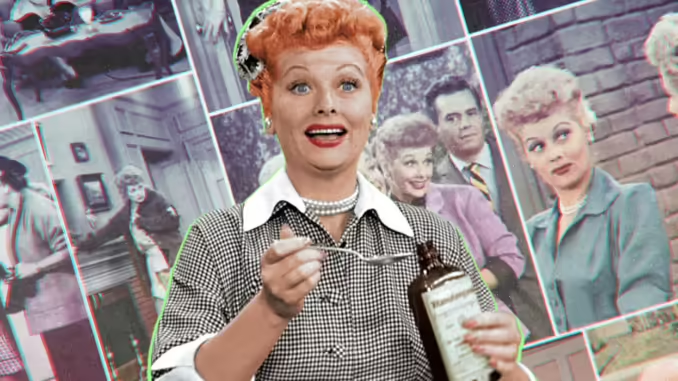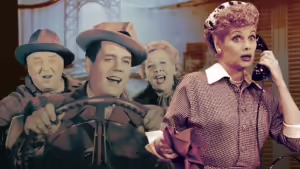
“Lucy, I’m Home!” – The Lasting Legacy of I Love Lucy and Its Iconic Stars

More than 70 years have passed since the phrase “Lucy, I’m home!” became a television staple, yet no other TV moment has managed to encapsulate romance quite like it. The enduring appeal of those words is rooted in the promise they carry: comedy, charm, and love.
When I Love Lucy debuted in October 1951, it fundamentally reshaped television. The show introduced viewers to the New York home of housewife Lucy Ricardo (Lucille Ball) and her Cuban bandleader husband, Ricky (Desi Arnaz). Adapted from Ball’s radio show Our Favorite Husband with producer Jess Oppenheimer, the sitcom was initially conceived as a way for Ball to keep Arnaz close, rather than having him constantly tour.
CBS was initially skeptical of the concept, objecting to the portrayal of an All-American girl married to a Cuban. To counter this, Ball and Arnaz showcased their vaudeville act, proving the network wrong. The authenticity of their marriage infused I Love Lucy with a genuine charm that resonated with audiences and contributed to its immense success.
“Lucy and Ricky Ricardo were dreamers,” notes Laura LaPlaca, Director of Archives at the National Comedy Center & Lucy Desi Museum. “Lucy was a housewife yearning for more, while Ricky was an immigrant entrepreneur carving out his path. Together, they crafted a unique, aspirational life.”
Their story was remarkably progressive for the era and remains relevant today. “Lucille Ball’s exceptional physical comedy and the show’s brilliant writing continue to entertain generations,” LaPlaca adds. “Some of the most memorable moments are the subtle, unscripted exchanges between them, reflecting their genuine affection and respect.”
Ball and Arnaz not only changed the landscape of television by being authentic, but they also broke new ground with the portrayal of pregnancy on TV. Furthermore, they founded Desilu Productions, a trailblazing company that played a significant role in television history until the late 1960s.
Arnaz was instrumental in developing filming techniques and multi-camera setups in front of live audiences, significantly enhancing broadcast quality. His innovations, along with those of his team, established the sitcom as a television staple, influencing the industry’s future.
“In the early 1950s, while many questioned television’s longevity, Lucy and Desi were already reshaping the medium,” LaPlaca says. “They were rule-breakers, innovators, and comedic masters. I Love Lucy remains beloved due to the dedication, energy, and love infused in every episode.”
Despite their marital struggles, Ball and Arnaz deeply respected each other’s talents. Ball relied on Arnaz’s business acumen to build Desilu into a powerhouse, while Arnaz adapted shooting techniques to showcase Ball’s comedic skills, including the use of a live audience to perfect her timing.
Television’s unique ability to bring characters into homes weekly has allowed audiences to embrace Lucy, Ricky, Fred (William Frawley), and Ethel (Vivian Vance) for decades. The show’s enduring popularity is evident in recent projects like Aaron Sorkin’s Being the Ricardos, TCM’s podcast The Plot Thickens: Lucy, and Amy Poehler’s forthcoming documentary Lucy and Desi.
LaPlaca refers to Ball and Arnaz as “the first couple of television,” highlighting their pioneering achievements. “They were the first international TV superstars, the first husband-and-wife team to run a TV production company, and the first to depict an interracial marriage and pregnancy on national TV. They set the benchmark for the sitcom genre, a legacy that continues.”
On I Love Lucy, the Ricardos’ story was intertwined with show business. Ricky’s nightclub success and Lucy’s aspirations for the spotlight fueled numerous comedic scenarios. Ball’s fearless physical comedy and the absurd situations she faced made the show unforgettable.
Their love story, often expressed through the entertainment industry’s lens, reflected their real-life romance. “Lucy and Desi’s love began on the RKO Studios backlot in 1940, and less than 20 years later, they owned that studio and led the largest independent TV production company,” LaPlaca explains. “In a time when being female or Latino in TV was a disadvantage, they built their success from scratch, overcoming numerous challenges.”
Ball and Arnaz’s marriage ended in 1960, marred by personal issues and infidelity. However, their on-screen chemistry and off-screen achievements left a lasting impact on television. Lucy and Ricky’s portrayal of domestic life remains both relatable and aspirational—a couple whose ups and downs are depicted with humor and heart.
They set a high standard for television power couples, blending their personal and professional lives in a way that continues to resonate. The legacy of I Love Lucy and its iconic stars endures as a testament to their groundbreaking contributions to entertainment, demonstrating that their storyneeds no further explanation to understand its significance.
